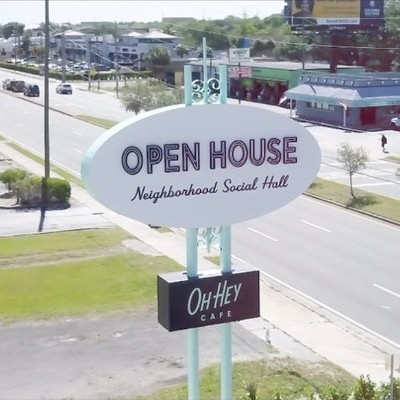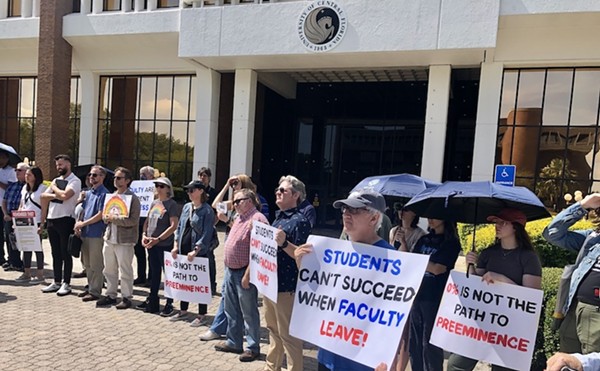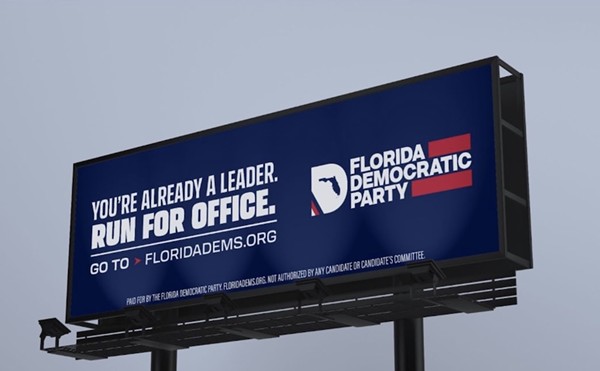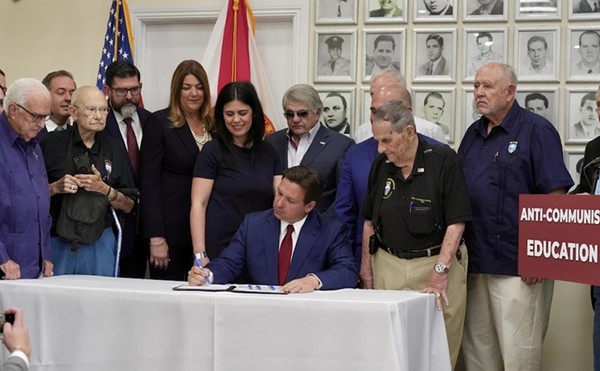Imagine walking through a huge shopping mall and suddenly coming upon a store that's selling reproductions of your own art work. You've never heard of this store before, but there it is, plain as day, stocked with your paintings. Somebody you don't know is making money from pictures that you've created.
Aghast, you step inside the store, and find out they've added insult to injury: Your name has been erased from the corner of your paintings, where you clearly signed them. "Whose work is this?" you ask a wandering salesperson. "We don't know," she says. "But aren't they fantastic?"
This is essentially what happened to Tampa-based circus performer Johnny Meah, who paints highly collectible sideshow banners. But the place he found his work being sold without his permission wasn't in a physical mall but on the Internet. And not on just any old rinky-dink website, but the big tent of websites: Amazon.com.
Meah's bright, uncluttered illustrations, which he's been creating since the late '50s, depict sideshow oddities and freaks, complete with deadpan declarations. Step right up to see the barracuda ape, "strange but true!" Behind this curtain is Popeye, "the man with elastic eyeballs!" Gasp and wonder at the two-headed infant -- a "frighteningly factual facsimile!" The banners, once created to lure patrons into attractions, have ended up in the Smithsonian Institution and other galleries. These days, a new work by Meah won't be hung outside a tent as a garish marketing tool; he paints for exhibitions and collectors, who pay a few thousand dollars for his 4-by-4-foot banners, more for his older, larger works.
Too much for you to spend for a cool painting of a fire eater? A Philadelphia-based company called Make It Big is at your service. Make It Big is providing Amazon with what Meah describes as "ghastly looking, grained-out" reproductions of his banners, as well as ones by other in-demand sideshow artists now deceased. Fifty dollars will get you a poster; $200 will get you the image reproduced on canvas. They're definitely Meah's images -- you can find pictures of the originals, with proper credit, in books such as "Freak Show and Freaks, Geeks, and Strange Girls." The Make It Big versions are identified by the works' correct titles, but Meah's and the others' signatures have vanished. Consequently, on the Amazon page, next to the word "illustrator" sits this declaration: "unknown."
After being alerted to the problem more than a year ago by an acquaintance, Meah actually went ahead and placed an order, paying $50 for a poster of his own work. He was distressed by what he saw: "They had taken a similar color to the border of the banners, which is almost invariably orange," says Meah, "and they had blocked out the signature."
Meah has dealt with other incidents of copyright infringement -- for example, the photographer William Wegman used some of Meah's banners as backdrops for his dogs, at first without Meah's permission, although once Wegman discovered the problem he gave Meah full attribution. When it came to the Make It Big posters on Amazon, says Meah, "I sat on this for a while, because it's not my desire in life to go after people with lawyers." Eventually Gary Fidler, a California lawyer Meah knows from business arrangements, sent letters to both Make It Big and Amazon requesting that they cease selling the works and asking for an account of the profits that had been made from them.
While a lawyer at Amazon "was appropriately astonished and chagrined and all of those adjectives about the whole thing," says Meah, the results were slim: specific pieces that had been mentioned in the letter were taken off Amazon, only to be replaced by others. Ten or so Meah images were originally being sold; as of press time, five were on the site, along with 40 or so more sideshow posters, credited to "unknown" illustrators, that are actually by deceased artists such as Fred Johnson and David "Snap" Wyatt. These people painted during the sideshow heyday and have achieved well-earned cult status. Meah's the sole survivor of this group -- "I'm it," he notes; "I'm the last of the Mohicans" -- and thus the only one who can cry out in his own voice against these works being displayed so blatantly on the 'Net. As Meah explains, "I'm still trying to make a living with this stuff."
Internet fraud is a ballooning problem, and most online fraud occurs at web auctions, in which a site such as Amazon or eBay exists simply as a meeting place for buyer and seller. Auction transactions are done on utter faith; often the seller provides nothing more than a product description and an e-mail address. If the product never arrives or is different than how it was described, the buyer is pretty much stuck, except for the small monetary guarantees that the bigger auction sites have begun to offer. Online auctions top the list in the number of complaints received by the National Consumer League's Internet Fraud Watch, accounting for 68 percent of complaints in 1998.
So it's not surprising that, after listening to a brief description of Meah's plight, Amazon spokesperson Sharon Greenspan assumes the Meah posters are being sold on the company's auction page. "We do have a fraud detection and prevention department," she explains. The department keeps an eye on copyright and intellectual-property infringements, but considering the pace and the incredible number of auction transactions, "Obviously we won't be able to catch everything," she offers. True enough. But shouldn't Amazon be expected to monitor the stuff sold on its own retail pages? The works by Meah and other banner artists are listed on Amazon's "books" store -- they popped up by doing a search for "circus freaks." Furthermore, as Meah discovered after making his purchase, Make It Big is not even mentioned in the paperwork that arrives with the poster: "They have not word one about the company that produced them," says Meah. "It's all attributable to Amazon."
Upon hearing an expanded account, Greenspan performs the "circus freaks" search herself, and when she sees the results is perplexed and a little taken aback. "So, this is us," she acknowledges. Unable to explain how the posters got on Amazon's retail-books page, she instead offers, "I would imagine if there was something not right, we would not sell it." Then she assures, "As soon as something like this is brought to our attention, we'll act." When told that a cease-and-desist letter had been sent, she says she will have to check into it.
A similar reaction comes from Wilbur Pierce, president of Make It Big. When asked for a response to Meah's accusations, Pierce says, "If he contacts me, and we determine that something has been done that's not right, and we believe it's in the public domain and it's not, we'll do something." Pierce explains that in such situations the artist could work out a financial deal with Make It Big or ask the company to withdraw the product. "We're in the licensing business," says Pierce, noting that Make It Big reproduces images of Charlie Chaplin, Norman Rockwell's work and other big names. "We're always paying fees, and we maintain a full legal staff."
When told that the company had already been contacted by Meah's lawyer, Pierce remembers the details of this incident -- that it involves circus banners and Amazon -- and says, "It's a claim, and not necessarily a valid claim." Nonetheless, he recalls that Amazon notified him, and that he had sent an e-mail to Amazon that said to pull the merchandise off their site. "We have so many images, it doesn't really matter," explains Pierce offhandedly. He no longer has the e-mail to Amazon on file.
"We are not a scam outfit. We're a reputable company," he says, adding that Meah "should be begging me to do this." Pierce insists he wants people to make money from licensing their images to him. "Everyone else wants to be a part of this," but if there's "one crack out there" who doesn't want to make an arrangement with Make It Big, well, says Pierce, "I'm more than happy not to make someone money."
Anyway, Pierce cautions, plenty of images are in the public domain, and he points out that Make It Big often produces in-house works in the style of someone famous. "We have our own artists who do an awful lot of redrawing," he says.
An e-mail reiterating the request for any of the correspondence regarding Meah or Amazon gets this e-mail response from Pierce: "I will pass on sending you anything. I will await his attorney's call and action and I will then present the material I have in discovery if necessary."
Lots of people revere cyberspace exactly because it's an unregulated free-for-all. "It's the Wild West out there," Meah says of the Internet, with a mixture of weariness and exasperation, "which is a phrase I've heard so many times I get nauseous from it." As with some unmapped, no-sheriff-here frontier town, policing the Internet poses some nasty problems. Cyberspace is not only unknowably huge, it's borderless.
But according to Erik Gordon, director of the Center for Retail Education and Research at the University of Florida, problems like Meah's have little to do specifically with pointing and clicking -- you can go all the way back to Gutenberg's printing press when looking for people reproducing other people's works without permission. Photocopiers and fax machines and scanners sped up the process, and these days, "As technology has made it easier to copy things, there's been a lot more worldwide infringement," says Gordon. People blithely sell counterfeit merchandise -- "cheap, crummy versions," he notes -- in other parts of the world in incredible volumes.
Hasn't the Internet added a new dimension? "Pre-Internet," says Gordon, Meah "would never have known about this. Most copyright infringement goes undetected." After all, who can say whether Meah's pictures are being peddled on T-shirts and keychains in Bangkok?
What a shriveled promise it would be if the Internet turned out to be the equivalent of a third-world bazaar, where you take your chances and don't ask too many questions. Gordon thinks that, at least to a certain extent, this won't happen. If the chorus of Internet fraud complaints grows louder and more articulate, e-businesses "will come up with a way to certify who's who," offers Gordon. He imagines a sort of "good-Netkeeping seal of approval, something that shows that they're legitimate, not two fraud guys in a garage who move every two weeks." Gordon thinks such an arrangement will more likely be voluntary, a cyber-self-regulation, rather than government-mandated.
The Clinton administration supports self-regulation -- and the corresponding efforts to educate consumers about how to protect themselves. President Clinton devoted his Nov. 27 radio address to safe shopping online -- the underlying message being that with caution and common sense, consumers can avoid mishaps and disasters.
In the absence of regulation, certain websites nonetheless exude legitimacy, luring the buyer into calm confidence. If you're not safe on respectable, stock-market-darling Amazon from the cyber version of shady-looking guys in trench coats muttering to you under their breath, where are you safe?
After checking into Meah's case, Greenspan, the Amazon spokesperson, acknowledges that the company had been contacted by Meah's lawyer and that items specifically mentioned had been removed from the site. This action, however, did not seem to prompt them to take a look at other Make It Big merchandise. Fidler, the lawyer, considers such a lax attitude at Amazon the grounds for possible legal action: "When you put them on notice that there's a problem," explains Fidler, "and they continue to do it, they're responsible. They know that the supplier is Make It Big. If the red flag goes up, you don't do business with Make It Big."
"If anything is brought to our attention, we will definitely not sell it," insists Greenspan. "We absolutely respect intellectual property and copyright." But at the same time, "We tend to trust that `our vendors` have the right to sell what they're selling -- that what people are supplying `us` is legitimate."
How much trust should we place in what materializes before our eyes on websites, charming us with dazzling graphics, perhaps lulling us into typing in our credit-card numbers? Why do we care less and less whether we can hold things up to the light, check their labels and get a receipt with the satisfaction-guaranteed exchange policy printed on the back? How can we be sure the sharp-looking e-store isn't cheating the Johnny Meahs of the world out of their due profits? Basically, we can't.
"The Internet is a place of a lot of cool, nice people who will give you free advice on newsgroups," muses UF's Gordon. "It's also a place where people spread viruses -- and think it's funny."
Not to mention the fact that, for all its vast stores of knowledge and deep labyrinths of trivia, the Internet presents information in a free-floating, disconnected way, where its doesn't surprise us to find art works minus their credits and suppliers without traceable locations. Ultimately, it's hard to put anything on a website into context. None of this does justice to an artist like Meah, and he's the first to admit it: "The reason my stuff sells is not because I'm the reincarnation of Rembrandt," Meah says simply. "It's the fact that I've got that much history behind me." In other words, the pictures are wonderful. But knowing where they came from is even better.
Step right up to see the real things.
An exhibit of Johnny Meah's banners will be at The Syd Entel Galleries, 247 Main St., Safety Harbor (just east of Clearwater), from Jan. 15-Feb. 15. An opening reception from 6 p.m.-9 p.m. Saturday, Jan. 15, features a performance and lecture by Meah. Call (727) 725-1808.



















